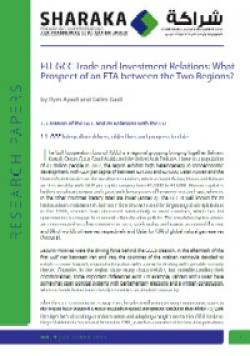EU-GCC Trade and Investment Relations: What Prospect of an FTA between the Two Regions?
The EU and the GCC formalised their relations in 1988 with the signature of a Cooperation Agreement and the engagement in negotiations for an FTA. Despite an ambitious framework, however, political and economic relations remain limited, as evidenced by the failure to conclude the FTA. Against this backdrop, and with the growing importance of the Gulf region's trade and investment relations with Europe and the geopolitical outlook for the Arab world, this paper analyses EU-GCC trade and investment patterns over the last two decades. The paper starts by providing a summary of EU-GCC relations. In the second section, it reviews patterns in bilateral trade and foreign direct investment, and goes on to assess both parties' interests and potential gains from concluding an FTA. Finally, it asks whether a free trade deal between the regions is likely and suggests possible avenues for strengthening economic and political cooperation.
-
Details
Roma, Istituto affari internazionali, 2013, 49 p. -
In:
-
Issue
Research Paper 5
1. Creation of the GCC and its Relations with the EU
1.1. GCC integration: drivers, objectives and progress to date
1.2. GCC relations with the EU: drivers, objectives and progress to date
2. Trade and Investment Patterns Between the EU and the GCC: What Diagnosis?
2.1. EU-GCC trade in goods
2.2. EU-GCC trade in services
2.3. FDI between the EU and the GCC
2.4. Sovereign wealth fund investments
3. The EU-GCC FTA: Motivations and Expected Impact
3.1. EU and GCC interests in the FTA
3.2. Studies on the impact of an EU-GCC FTA
4. Prospects and Recommendations for Improving EU-GCC Trade and Investment Relations
4.1. Prospects for concluding the EU-GCC FTA
4.2. Recommendations for improving EU-GCC trade and investment relations
Conclusion
References
Annexes
Topic
Tag
Related content
-
Ricerca27/12/2013
SHARAKA - Enhancing Understanding and Cooperation in EU-GCC Relations
leggi tutto



